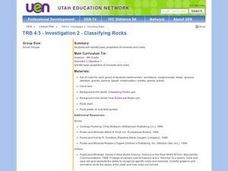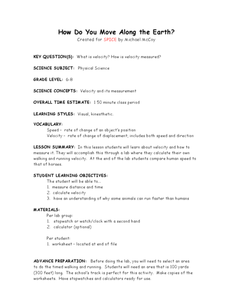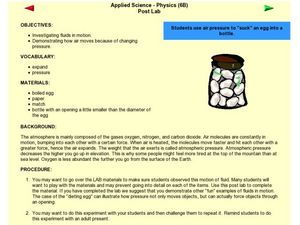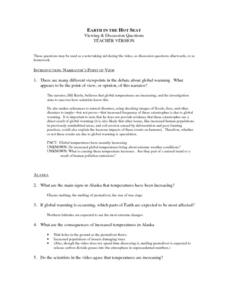Curated OER
Taking Charge of our Earth and its Resources
Students identify natural resources, discuss conservation and protection of them, and identify how pollution is harmful to the environment. Seven lessons on one page.
Curated OER
Water-holding Capacity of Earth Materials
Students design and conduct an experiment to test their ideas about how to speed up or slow down the rate of an enzyme-catalyzed reaction. They have access to an array of physical and chemical factors that might influence enzyme...
Curated OER
Investigation 2 - Classifying Rocks
Fourth graders identify basic properties of minerals and rocks. They access websites and utilize worksheets imbedded in this lesson to further their understanding of rock classification.
Curated OER
Earth: The Water Planet
Students elicit data on the water cycle, ocean topography, and island formation in this six lesson unit. The ocean floor and the properties of water are examined through a variety of discussions and hands-on experiments.
Curated OER
Investigation 6 - Dinosaur Extinction
Fourth graders research and analyze theories on why dinosaurs became extinct. They need to find clues as to what the cause may have been. They record the evidence that they find to support their theory on the Dinosaur Extinction Theory...
Curated OER
Investigation 3 - Examining Your Fossil
Fourth graders examine the fossils they made previously. They examine the details of the fossil with a hand lens and come up with conclusions about the fossils. They record what they see and draw conclusions about the environment of the...
Curated OER
Structure of Earth
Seventh graders study and make a model of the significant formations of the ocean floor. They examine images and illustration and apply their imagination while creating the model. They are challenged to complete further research as an...
Curated OER
Investigating Earthquakes: GIS Mapping and Analysis
Pupils describes the technique of preparing "GIS-ready" data and shows how to map that data and conduct basic analyses using a geographic information system (GIS).They use latitude and longitude fields to plot the data in a GIS and...
Curated OER
Earth's Ecosystem: Seven Major Biomes
Students discuss the different types of ecosystems and the composition of biomes. Working in groups, they define various related terms and make posters of them. Then they explain their posters to the class.
Curated OER
Investigating Fresh Water Ecosystems
Sixth graders examine the fresh water ecosystems. In this environmental lesson, 6th graders work in groups to collect information about a fresh water ecosystem and report their findings to the class in the form of a brochure.
Curated OER
How Do You Move Along the Earth?
Students determine their own walking and running velocity. In this physics instructional activity, students calculate velocity using distance and time information. They compare human and animal speeds.
Curated OER
Ocean Careers Investigation
Students gather information about different careers of the Ocean Adventures expedition team. In this career studies lesson students work in groups, read an interview with an Ocean Adventurer, and see the importance of working in a...
Curated OER
Science of War
Tenth graders, from an environmental perspective, study the pros and cons of war. Distinctions between characteristics of biological, chemical and nuclear threats and the impact of economic development are considered.
Curated OER
Saltwater Science
Students conduct an experiment that shows them how salt water allows things to float. In this salt water lesson plan, students mix ingredients together to create salt water and observe how it makes the oceans dense. They then interpret...
Curated OER
Using Mathematic Models to Investigate Planitary Habitablity
Students examine how the sun's intensity affects the temperature on various planets. They determine whether or not these planets could be habitable. Finally, they factor in the average albedo of the planets to determine whether or not...
Curated OER
Applied Science - Physics Pos Lab (Air Pressure)
Students examine physics. In this air movement lesson, students conduct an experiment that shows how air moves based on the pressure it's under. They watch the teacher complete the procedure and then try it on their own in a small group....
Science 4 Inquiry
Edible Plate Tectonics
Many people think they can't observe plate tectonics, but thanks to GPS, we know that Australia moves at a rate of 2.7 inches per year, North America at 1 inches per year, and the Pacific plate at more than 3 inches per year! Scholars...
Curated OER
Scenes of the Earth
Students examine and study how changes in perspective can change the way that they can observe objects. They explore the relationship between a scene's area and its detail. Each student looks at the ground through cardboard tubes from...
Curated OER
Earth in the Hot Seat
Young scholars identify the different viewpoints on the issue of global warming. While watching a video, they take notes on the issues presented to them and answer questions about what Alaska, Peru and East Africa are doing to prevent...
Curated OER
Wind Power
What a wonderful way to explore wind power! Through this lesson, learners get a background in the history of wind power, create their own wind turbine, and the test their designs. This is a terrific way to tie scientific principles to...
Curated OER
Fossil Fuels (Part II), The Geology of Oil
More of a mini-unit than a lesson, these activities lead inquisitors through a survey of oil deposits. In the first part, they read about and view diagrams of sedimentary rock layers that trap oil. Next, they test porosity and...
Science 4 Inquiry
Deforestation
Young scientists observe deforestation from satellite photos and discuss the importance of forests to the global environment. They then simulate a plot of forest when farmers move into the area over the course of seven years. Finally,...
NOAA
I Can't Breathe!
The Gulf of Mexico dead zone, an area of low oxygen that kills marine life, costs the United States $82 million every year. Young scientists research anoxic ocean environments then come up with a hypothesis for the cause of the Gulf of...
Curated OER
Volcanoes
Students investigate types of volcanoes. In this earth science lesson, students view a diagram of a volcano on an overhead projector and discuss the types of volcanoes. Students choose a volcano and write five facts about it.

























